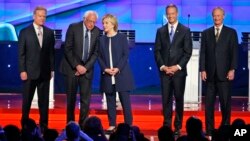Political fact-checkers in the U.S. say that numerous claims made by the Democratic presidential candidates at their debate Tuesday night are dubious at best and in many cases simply wrong.
Fact-checkers at The New York Times, The Washington Post and Politico agreed that the party's leading contender, former Secretary of State Hillary Clinton, misstated State Department policy when she said the agency she headed from 2009 to 2013 "allowed" her to use a private email server to send and receive personal and government messages.
"That's dubious," Politico said. "Clinton has made this claim repeatedly, but a State Department policy on the books when she was secretary said routine work-related email use should be conducted on official systems."
Clinton's use of a private email server set up in her home outside New York City has embroiled her campaign, with many voters questioning her honesty about the issue.
Competing narratives
She says that she never received or sent emails labeled as classified national security documents, but U.S. investigators say their ongoing review of thousands of her emails already has turned up dozens that should have been classified as such.
Clinton said a congressional investigation into her use of the email is a Republican-inspired attempt to undercut her presidential campaign, but said she would answer questions about it at an October 22 hearing.
The fact-checkers also questioned Clinton's claim that former national security contractor Edward Snowden would have been protected by U.S. law as a "whistleblower" had he disclosed his complaints about American surveillance programs to U.S. authorities. Instead, he leaked thousands of documents two years ago to news agencies before fleeing to Russia to live in asylum.
Politico and The Washington Post noted that government workers are protected against retaliation internally when making complaints about government programs, but that Snowden was working for a government contractor and would not have been covered by the law.
'Gold standard' statement
The fact-checkers questioned Clinton's claim that as the country's top diplomat she had "hoped" the recently negotiated 12-nation Pacific Rim trade deal "would be the gold standard."
A few days ago, she announced her opposition to the deal, saying it did not meet her standards. The fact-checkers noted that in 2012 she said the deal "set the gold standard in trade agreements."
The news agencies also questioned claims by Clinton's leading challenger, Vermont Senator Bernie Sanders. They said his claim that the U.S. has "more income inequality than any other country" is not remotely true, with income inequality much higher in the under-developed world, especially Africa.
They also said Sanders understated the extent of poverty in the U.S. He said 27 million people live in poverty, when the correct figure is more than 46 million.
The fact-checkers also found fault with some claims made by the three other Democratic contenders, former Rhode Island Senator Lincoln Chafee, former Virginia Senator Jim Webb and former Maryland Governor Martin O'Malley.




